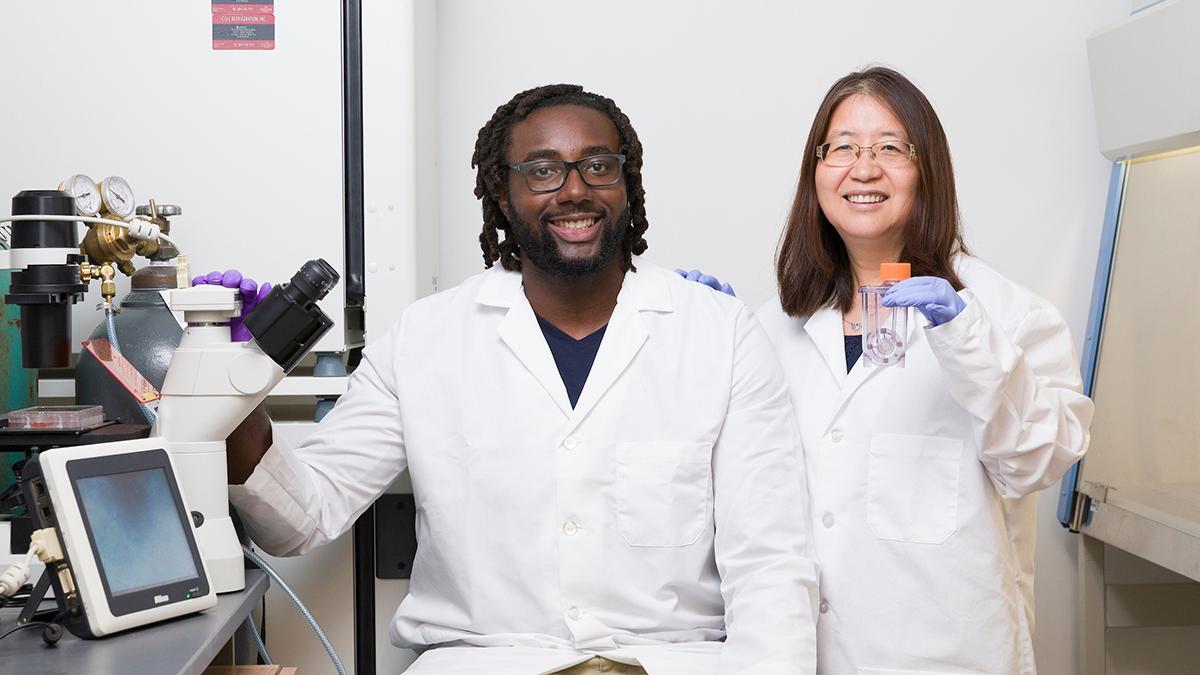
Graduate student Justice Ene (left) and Professor Yan Li in the lab in the Interdisciplinary Research and Commercialization Building in Tallahassee, Florida. The team has developed a new way to mass-produce tiny healing particles from lab-grown blood vessel tissues, potentially making experimental therapies more affordable and accessible for treating age-related diseases. (Scott Holstein/FAMU-FSU College of Engineering)
Breakthrough bioreactor technology could make experimental age-related disease treatments more affordable and accessible
Researchers at the joint FAMU-FSU College of Engineering are pioneering a groundbreaking method to mass-produce tiny healing particles derived from lab-grown blood vessel tissues. This innovation could revolutionize experimental therapies for age-related diseases, making them more affordable and accessible to patients worldwide.
Leading Multidisciplinary Research in Regenerative Medicine
Florida State University and joint college researcher Yan Li is leading the study with a team of multidisciplinary researchers from the college. Li is a professor in the college’s Department of Chemical and Biomedical Engineering, and the work she and her group are conducting was recently featured in the journal Stem Cell Research & Therapy.
“Imagine if we could harvest microscopic delivery trucks from lab-grown human tissues to carry healing molecules directly to damaged cells in our bodies,” Li said. “That’s essentially what we have accomplished in our investigation.”
Understanding Nature’s Cellular Communication System
The “delivery trucks,” known as extracellular vesicles (EVs), function as nature’s postal service. Human cells naturally package beneficial proteins and healing compounds into these tiny bubbles, dispatching them to communicate with other cells throughout the body. Through extensive research, scientists have discovered that EVs from specific tissues can repair cellular damage and decelerate the aging process.
“EVs can even reach hard-to-access sites like the brain,” said Justice Ene, a graduate student researcher on the study. Ene suggested that novel treatments could be developed with limited side effects on a patient’s quality of life.
Overcoming Production Challenges with Advanced Bioreactor Technology
“The main challenge has been scaling up production of EVs,” Li explained. “This has been a significant hurdle because traditional lab methods yield very few of them, making potential treatments extremely expensive.”

The researchers developed an innovative solution using Vertical-Wheel Bioreactors (VWBRs) to address this bottleneck. These sophisticated bioreactors feature spinning chambers that create gentle currents mimicking natural blood flow in human bodies. The systems are specifically designed for culturing sensitive cells like stem cells, which require gentle yet effective mixing conditions.
The advanced process enables scientists to create small, lab-grown structures that mimic human blood vessels, known as blood vessel organoids. This method significantly boosts EV production while simultaneously improving the metabolic health of the tissue being studied.
“Think of it like the difference between a factory running at normal capacity versus one operating at peak efficiency under optimized conditions,” Li explained. “Essentially, the gentle spinning motion enhances both the quantity of these essential vesicles and the overall health of the artificial blood vessels.”
Breakthrough Results Maintain Therapeutic Properties
The research team extensively tested their mass-produced EVs and confirmed they maintained all their healing properties. In laboratory tests, the EVs successfully reduced cellular damage from aging and boosted cell growth—key indicators that they retain their therapeutic potential even when produced at larger scales. The breakthrough effectively solves the fundamental bottleneck that has prevented EV-based therapies from reaching patients.
“I hope that the research on EVs increases because of our study,” Ene said. “In the future, we need to explore the composition of therapeutic cargo and learn how well the research translates to safely being produced at a large scale. There are still many questions, but it’s a step in the right direction.”
Creating Pathways for Affordable Medical Interventions
By developing a scalable, controlled production method, the researchers have created a clear pathway for these promising treatments to transition from laboratory curiosities to potentially affordable medical interventions for age-related diseases and tissue damage.
Collaborative Research Excellence
This multidisciplinary project represents true academic-industry collaboration, involving student researchers and faculty from various departments within the FAMU-FSU College of Engineering, including chemical and biomedical engineering, industrial and manufacturing engineering, and the High-Performance Materials Science Institute. The research also includes partnerships with PBS Biotech Inc. and the Department of Biomedical Sciences at FSU’s College of Medicine.
The research is supported by the National Science Foundation (NSF), including the NSF INTERN award, and is partially funded by the National Institutes of Health. This work paves the way for promising treatments that can transform laboratory findings into practical medical solutions for age-related diseases and tissue damage.
Editor’s Note: This article was edited with a custom prompt for Claude Sonnet 4, an AI assistant created by Anthropic. The AI optimized the article for SEO discoverability, improved clarity, structure and readability while preserving the original reporting and factual content. All information and viewpoints remain those of the author and publication. This article was edited and fact-checked by college staff before being published. This disclosure is part of our commitment to transparency in our editorial process. Last edited: 09-22-2025.
RELATED ARTICLES
Professor Yan Li Inducted into 2024 AIMBE College of Fellows Class
Researchers Use 3D Culture Techniques to Develop Improved Therapy for Neurological Diseases
